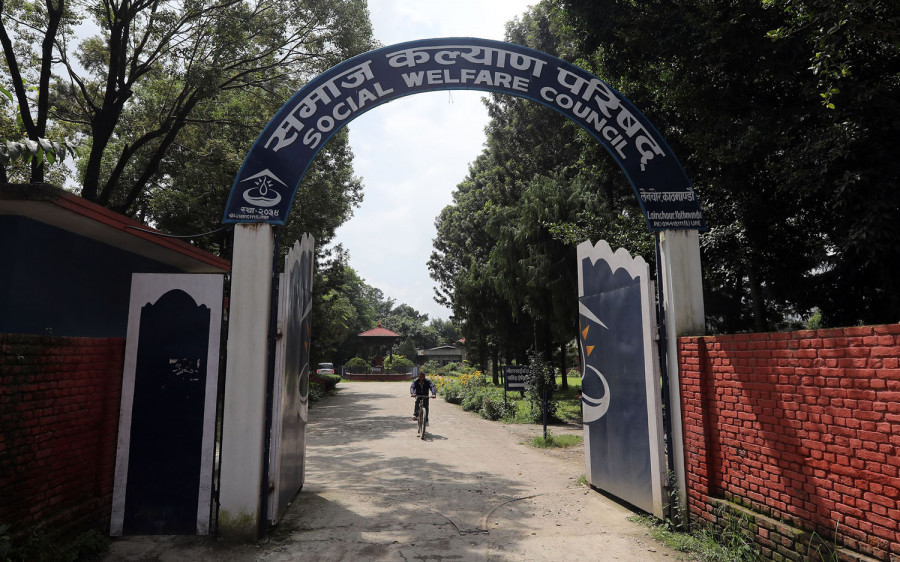National
International NGOs want clarity concerning temporary staff in government’s social security programme
The council says the enrolment numbers will grow after all outstanding concerns are addressed.
Prithvi Man Shrestha
Women Skill Creation Centre, a Hetauda-based non-governmental organisation, has registered itself at the Social Security Fund to participate in the government’s social security programme.
The centre, however, has not enrolled its employees under the scheme due to confusion regarding how its employees could get a long-term benefit when their jobs are temporary. This centre is running various projects in the areas of women empowerment, human trafficking, strengthening of judicial committees at local levels and climate change, among others.
Nibhas Gajurel, the finance chief of the centre, said the employees have not been enrolled because it is unclear how they could benefit from the programme since they would be jobless after the project period is over. “Our board will take necessary decisions about enrolling employees,” he said.
Although the government received a lukewarm response to its social security scheme from the private sector enterprises, domestic and international non-governmental organisations have committed to enrolling their staff under the programme.
There are four types of schemes under the programme—treatment, health and maternal security plan; accident and disability security plan; dependent family security plan; and elderly security plan.
Representatives of international and domestic international non-governmental organisations recently submitted a commitment paper to the Social Welfare Council, saying that they will enrol their staff under the scheme.
“After holding a meeting with the Association of International NGOs in Nepal, we have jointly submitted the commitment paper to the council,” said Jitram Tharu, president of the NGO Federation Nepal, a grouping of local NGOs. “We have decided to enrol employees associated with existing projects based on the understanding reached with donors and make the provision of social security for employees in new projects to be rolled out in the future.”
According to the Association of International NGOs, most of its members have registered with the Social Security Fund. “About 80 percent of the association members have enrolled their employees under the government’s programme,” said Achyut Luitel, president of the association. “But we have not deposited the funds yet due to several confusions regarding the scheme.”
There are a number of issues on which I/NGOs want clarity, including how to ensure facilities for their employees because of the temporary nature of their jobs and how a married couple could benefit if both are employed at the same organisation.
According to the office of Social Security Fund, only 582 NGOs and INGOs have registered as of last week. It is too small compared to the total number of NGOs and INGOs affiliated with Social Welfare Council, a regulatory body of the NGO sector.
As of the last fiscal year 2018-19, there are 50,358 NGOs affiliated with the Council while the number of INGOs affiliated with the council stood at 245. Association of International INGOs has 135 members.
But, Lama said that the number of NGOs enrolling in the programme would grow once the government clarifies on some of the concerns raised by the NGO sector. “We have already appealed the NGOs and INGOs to enrol in the system,” he said. Lama expects around 2,000 NGOs, who receive foreign funding, will participate in the programme.
The council last week appealed to the local NGOs to participate in the scheme, saying that the Social Security Act, its regulation and working procedure have made provisions for enrolling the employers, employees and self-employed people.
“As per the request of the government, we have appealed to the NGOs,” said Shiva Kumar Basnet, a spokesperson at the council.
The contribution-based Social Security Scheme is one of the most ambitious programmes of the KP Sharma Oli administration. The programme was rolled out in November last year, aiming to protect and secure private-sector employees whose safety and welfare has long been a cause for concern.
The government aims to serve nearly 3.5 million people in the national campaign to ensure the social security of private-sector workers with a comprehensive welfare package. But, the response to the welfare fund so far has not been encouraging. As of last week, 11,928 enterprises had registered with the Social Security Fund.
There are 922,445 economic establishments (firms related to agriculture, trading and industrial and services, and various other institutions) as of April 14, 2018 that engage more than 3 million people, according to the National Economic Census conducted by the Central Bureau of Statistics.




 9.51°C Kathmandu
9.51°C Kathmandu














